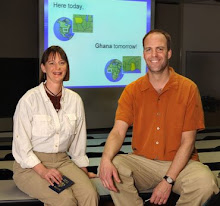After nearly 2 weeks of air conditioning, catered food, and swimming pools, Chris and I have returned to site. We have been away at a Peace Corps all-Ghana-volunteer conference which was immediately followed by our education sector Close of Service (COS) conference. It was a nice respite except for the fact that we’ve been reminded of all of the work we have left to do with such little time remaining.
Shortly after returning, we learned there would be a funeral in town. We could tell because a truck load of revelers dressed in black and red clothing came tooling down the road whooping and hollering (much like you would see before a college football game). After nearly 2 years, many things have started to feel routine in our lives here in Ghana. So sometimes when I see, hear, or experience certain things, I try to think back to how I would have viewed them when I first arrived. I remind myself of these feelings in order to maintain an appropriate perspective for when I return to the U.S, to remind myself how special my experience here is, and to cue me in on what to put in this blog. In the process, I am sometimes also reminded of just how far away from home we actually are.
Men in traditional funeral dress
In Ghana, it is fashionable for funerals to last about 4 days. For Chiefs and dignitaries they may last a week or much longer! One could write an entire book about funerals in Ghana (in fact I think some have already been written) but in a nutshell, they go something like this: On Thursday, canopies are erected, plastic chairs placed in rows, the biggest sound systems in town are hooked up, and visitors travel from far & wide to the specified town or village. On Friday, the body is displayed, music is blasted, there is gospel karaoke, drumming, dancing, and drinking. On Saturday, there is usually a morning service while the body lies in state, followed by more of the Friday activities. And on Sunday there is a final service (and also the burial if it did not take place on Saturday). I have broken these activities down by day, but in actuality the music typically goes on continuously throughout the night and one day runs into the next. Collections are taken throughout. Close friends or family members staff the donation table and write receipts for each amount given. Depending on the level of donation, you might receive a memorial t-shirt, a full-color funeral brochure, or for more modest donations you might receive a handkerchief with a picture of the deceased, or some type of trinket (i.e. yesterday, we saw that people were sporting a cord of red & white yarn with a black plastic ball attached).
Scenes from a chief's funeral
On our way to buy eggs yesterday, we noticed at least 20 people dressed in their specially made funeral garb hanging around the police station. It seemed a bit odd but we greeted one another and passed on our way as usual. We later learned that this weekend’s funeral turned into a brawl, and that those people hanging around at the station were there because they had been arrested. We’re not sure what the main cause was, but the formula for the fight included the local brew, a lack of license or purchased permit to hold the event, and a village/family feud.
When we inquired further with friends and neighbors, we learned that the funeral was for a young man of 25 years. He was a student at DASHS before Chris and I arrived and had been working at the district hospital in town. Why he died is a bit of a mystery. The victim’s sister died only 6 months ago apparently under similar circumstances. It seems that each of the siblings simply fell ill and never recovered. We were told that this young man ironically did not seek treatment at the hospital where he worked, but instead went to a prayer camp. When we probed as to the reason why an educated man would shun conventional medicine for prayer alone (wouldn’t both be a good idea?) we were told that some months ago there was a quarrel between the children’s mother and their grandmother. After said falling out, the grandmother cursed her daughter claiming that her children would be taken from her one at a time as punishment. The grandmother, we were told, is a witch. Until yesterday I had never heard of the wicked witch of Afram Plains.
God willing, Chris and I will be back in the States in precisely 90 days. And while parting from Ghana will bring such sweet sorrow, I sometimes find myself tapping my heels and thinking: There’s no place like home, there’s no place like home.




No comments:
Post a Comment